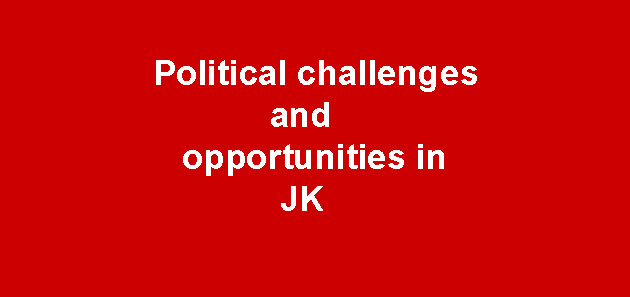Wg Cdr Mahesh Chander Sudan (Retd)
We, the people of Jammu and Kashmir, are passing through a transitional phase; the ongoing electoral exercise is about to bring in change in the mode of governance from LG to participatory one comprising of democratically elected public representatives. This constitutional transformation understandably after an unusually long period of ten years is likely to be blended with challenges and opportunities for elected representatives to align the course of state welfare within the democratic framework. The centralized way of governance by the nominated Head of the Union Territory over the period of time and practice has distanced itself from the basic spirit of reaching last person in the queue and possibly remained within the bureaucratic corridor of Government offices. The system therefore has acquired a single point mechanism in place of multilayered business transactions for achieving transparency, accountability and general accessibility to ordinary citizens as desired in the functional democracy. A glaring example of excessive bureaucracy and system dependence on few hands hampered the process of selections, tests and recruitments in the Government sectors during the period in question and it is alarmingly inimical to cover up these mischiefs by cancelling recruitment processes adding further to the unbridled unemployment. This impending transition is expected to usher us towards the right mode of governance, no matter it has challenges at various fronts.
The ground situation and the interaction with voters indicates that no political party is likely to be blessed with majority mandate and a fractured mandate not only will compel formation of alliances but also pose inherited challenges to maintain a stabilized coordination between the alliance partners. However, there are few visible challenges like restoration of Statehood, Security issues, adaptability to recently amended transaction of business rules 2019, Burgeoning Unemployment, regional imbalances, Issue of Kashmiri Pundits, Management of Fiscal deficit, Industrial growth, Land ownership and employment issues, Unilateral Abrogation of Article 370 and 35A, Economic growth, road infrastructure and other day to day issues like electricity and water.
Among all other issues, the restoration of Statehood is going to be a big challenge for the new Government despite the fact that Union Government headed by BJP has assured on many platforms that statehood status would be revived at the appropriate time. This issue has occupied a prominent place in the election campaign of almost all the participating political parties and the public expectation for the same would be clamoring intensified post formation of new Government. However, recent amendments issued by Union Government with regard to transaction of business by the Government of Jammu and Kashmir indicates likely delay in this regard that would affect working relations of the two Governments encouraging avoidable wrangling between LG and the UT Government.
Other most important challenge for the new Government is going to be the issue of terrorism that has affected the state of Jammu and Kashmir for last four decades with trans-border involvement of neighboring country. Terrorist activities in the recent past have exponentially increased in Jammu region and incidents have also occurred in Kashmir valley coinciding with declaration of election schedule, meant to disturb peaceful conduct of three phased elections in the Union Territory. It also indicates that the people of Jammu and Kashmir have a serious task to elect a stable Government that can handle security issues in coordination with the Union Government.
The welfare of the State depends largely on the economic strength and economy of the Jammu and Kashmir basically depends on Tourism, Agriculture, horticulture, Services, Industry, handicraft, Animal husbandry and sericulture. The economy is primarily services based and agriculture oriented. Though, the GDP growth as per latest economic survey is 7.4% and projected as 7.5% in the financial year 2024-25. However, the Reliance on central grants around 46% of the budget is to be progressively reduced and move towards self-reliance with more growth oriented economic policy framework. There is urgent requirement to strengthen the Industry sector for generating more employment opportunities and economic support for overhaul growth of the economy.
Burgeoning unemployment of educated youths is a major issue that requires immediate attention of the next Government. As per Labour Force Annual survey reports for 2022-23, the Unemployment rate for India stands at 3.2% whereas for J&K it is 4.4, higher than the national average. Besides, filling vacant posts, reviving employment generating sectors, a right atmosphere and resources for self-employment should be given right focus. An effective employment policy frame work should also help the Government to overcome this issue.
The new Government formed either by Majority mandate or by Coalition would have to streamline the disturbed track of governance during last ten years, limited governance dispensed through an alternate arrangement of LG and his limited team of advisors has reduced the system to single point control and needs to be reversed to democratic way of functioning. The new Government should take it as Godsend opportunity and serve the poor people of the Union Territory by restoring them the most deserved Statehood, peace and prosperity, more employment opportunities through effective political management, dedicated workmanship and required administrative skill. There are challenges within the system of realigning governance for larger State welfare in decentralized mode as laid down in the Constitution of India.


